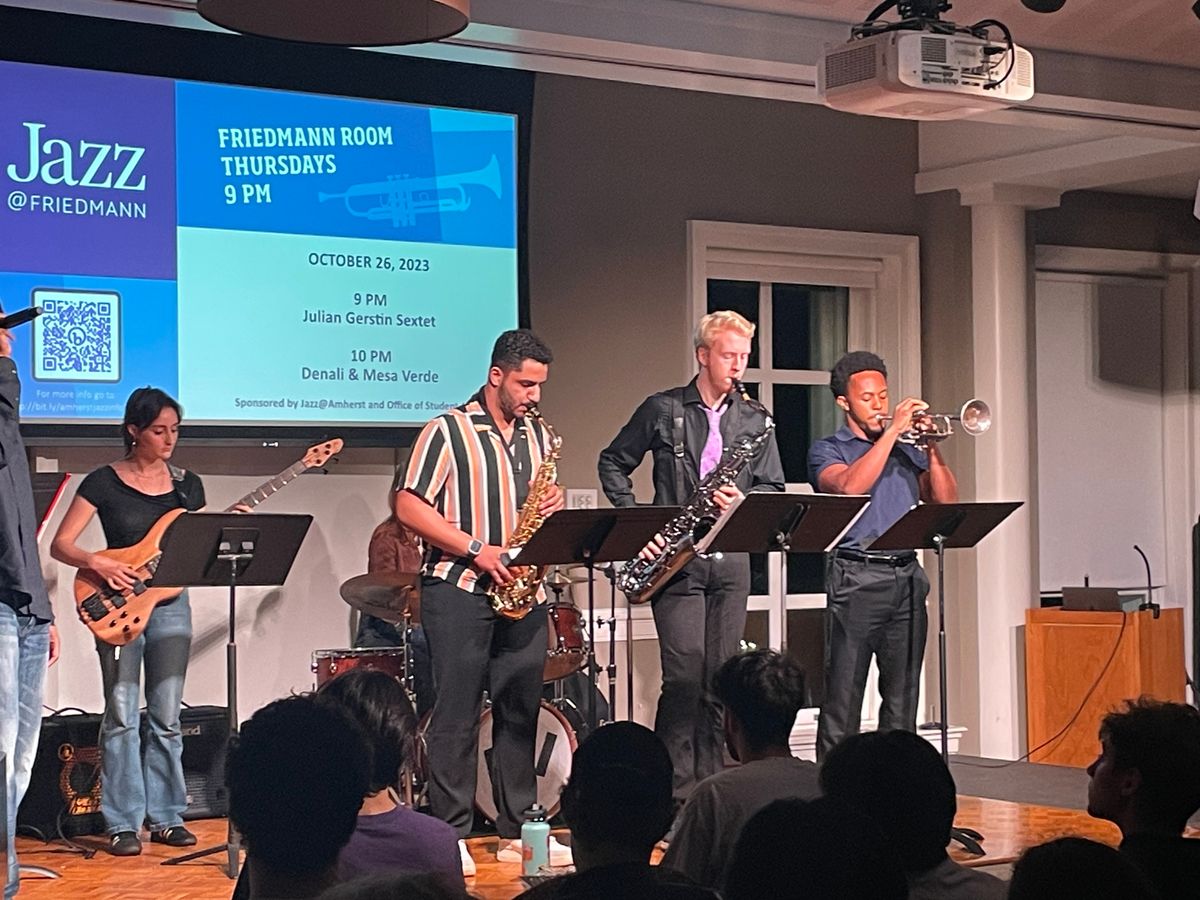Jazz@Friedmann Skillfully Closes the Semester
Thursday marked the final performance of Jazz@Friedmann for the semester. Kobe Thompson ’24 applauds the Julian Gerstin Sextet and the student groups Denali and Mesa Verde for their strong close to the series.

Stepping into the Friedmann Room this past Thursday transported me to another time and place. For the semester’s fourth and final installment of Jazz@Friedmann, the audience was treated to non-U.S. styles of jazz from the Julian Gerstin Sextet and the student jazz combo Mesa Verde. Between these two groups were selections of classic cuts from Denali, another student combo. The groups used a wide array of instruments to showcase the full range of jazz music. Just the sight of three different types of drum made my heart beat in anticipation.
The Sextet kicked things off with the Cuban-flavored “Iroko Hop,” an original inspired by Gerstin’s ethnomusicology research. A percussive lead-in gave the song a punchy groove. “Iroko Hop” was a musical debate, with its infectious beat as the topic of discussion. The song’s progression came from a swelling of instrumentation, with every musician yelling over each other until, gradually, all but one would die down and make space for the solo instrument. This order in the chaos made each performance that much more prominent. The trumpet, played by Don Anderson, commanded the room with an opening drawn-out note lasting no less than 10 seconds. This set the solo apart structurally and demanded attention.
The next song, another original by Julian Gerstin, saw bassist Matt Cony swap his upright bass for an electric. The swap helped set the tone for “Polar Bear Meltdown,” the musical equivalent of keeping cool on a hot summer day. But the bass did not drive the song; that would be the stylings of pianist Eugene Uman. The song was akin to a person telling a story that just happened earlier that day, as the piano worked the song like an orator would work a room through entertaining conversation. Uman’s playing was punctuated by the band continuing his musical ideas, as if we could witness this story unfolding as a flashback carried by the clarinet and the trumpet, played by Anna Patton and Don Anderson, respectively. The song ended shortly after an incredible drum solo from Ben James that grew progressively more energetic and hectic.
“Kaiman Ka Mode” was the group’s return to a tropical sound, drawing again on Gerstin’s Caribbean influences, this time from Martinique. It was simpler, following a style known as “bélé.” The piano played a militant, dangerous riff, and Gerstin led a wild and rushing beat on the congas. Things reached a fever pitch as Gerstin switched from the congas to a tanbou bélé drum, a barrel drum upon which one sits and which can be played using one bare foot, as Gerstin did. The solos offered moments of musical clarity, juxtaposing the song’s mad ambiance in respites of meticulous musical expansion.
The speed of “Kaiman Ka Mode” starkly contrasted the group’s slowest and shortest song, “Love That Stumbles Over the Earth in Ecstasy.” The song’s title was hauntingly accurate in its specificity. No one instrument was featured alone in this song, paradoxically creating a feeling of loneliness. The slow tempo and drawn out cadence created a yearning mood. The band wandered aimlessly through the soundscape, seeming to drunkenly call out for a lover who was not answering.
The Sextet ended the set with two energetic and moving pieces, the first of which, “I Remember It Differently,” was in the style of a Kapanitsa, an Eastern European line dance with an unorthodox time signature. In this piece, Gerstin returned to the tanbou bélé and the clarinet grew increasingly frantic, an energy both supported and propelled by the rest of the accompaniment. This set the scene for a shockingly wild drum solo on the tanbou, causing the room to fall silent. Gerstin showed just enough restraint to signal to the audience that, while the tanbou was being played with the fervor of an insane man, it was clearly a disciplined hand (and foot) beating the drum.
The final piece, “Rosemary and the Taxi Driver,” featured a notable partnership between the clarinet and the trumpet. The bass became electric, the piano played a simple repetitive riff, and the drummer gave vocal interjections. This song, in all of its glory, felt like a blast to the past. This nostalgia came from a piano solo that felt both as if it was saying, “You don’t know about this, young buck,” and “I still got it!” It was show-offy, it was proud — it was amazing. The solo on the keys was followed by an incredible display by the clarinetist and trumpeter trading phrases and building off of each other like two old friends shooting the breeze. This sense of friendly competition built up their respective performances into one big statement.
That was an important sentiment for the Sextet to end on, because soon after the stylings of the Denali combo delved deeper into that idea. Led by charismatic frontman on vocals, Stanley Jackson ’25, Denali played a host of older songs. Starting with Count Basie and Frank Sinatra’s classic “Fly Me to the Moon (In Other Words),” Jackson’s singing was beautifully accentuated by the two saxophonists, Amr Al-Dayeh ’26 and Adrian Whitley ’26, and trumpeter Noah Turbes ’27. The group didn’t take too many risks, mostly sticking to the recognizable motifs. I was impressed by Turbes’s solo as well as the bass solo by Vica Henry ’25.
Denali continued with a more modern song, a rendition of “Pastor ‘T’” by The RH Factor, which had some incredible moments of the musicians playing a game of catch with the musical motifs. Pianist Nathan Lee ’26 was given more time for a longer solo, which was worth every second. His rhythm was an incredible stand-out. Another solo by guitarist Milo Leahy-Miller ’24 was more subtle, starting whisper-quiet before becoming bold and gritty. The song’s highlight was a back-and-forth between drummer Annika Ridky ’25, Leahy-Miller, and Whitley, which was a masterclass in spacing. Ridky played complex rhythms that complimented the song’s thematic ideas — but still avoided the pitfall of many drum solos, in which a song’s established rhythm is dashed in an effort to impress. She would then give space for either Leahy-Miller or Whitley to use her rhythmic ideas, and the trio worked in harmony together.
Before long I found myself down south, listening to Jackson sing so sincerely in the combo’s rendition of Ray Charles’s “Georgia On My Mind.” This song highlighted Jackson’s background of singing in church, with his syncopation and southern flair doing the song so much more than justice. Both Turbes and Whitley had moving solos that captured the crestfallen side of nostalgia. Their instruments painted a picture of a place that exists only in one’s memory, forever fleeting, immortalized in its impossible beauty. It was around this time I wish that the song selection had given more to the saxophone, as the two saxophonists very rarely shined outside of Whitley’s occasional solo. Al-Dayeh and Whitley could have complemented each other instead of harmonizing, in a similar way to the clarinetist and trumpeter in the Julian Gerstin Sextet. Lee soon mused during a meditative piano solo, an impressive display that felt like a person smiling while crying.
The night could not have ended any better. The reputation of Mesa Verde preceded them. Another attendee beside me, Rudy Echavarría ’26, described for me his excitement for what was to come in the next 30 minutes. Even this praise did not prepare me.
“Listres Monfunas” was a fantastic opener. Amid a hot, percussive melody, brief breaks occupied by just one or two instruments acted as spotlights. Especially notable were the flute (played by Camila Bonilla ’26), guitar (played by Adam Schultz ’25), and clavé (played by Bodhi Liveright) which are crucial instruments to the distinct sound of Afro-Latin jazz. The song featured an extended drum break where Daniel Flores-Garcia ’24 and Kaisar Perry ’26 trade percussive blows on a pair of bongos and congas, respectively.
The combo then gave their rendition of the classic Cuban piece, “Negra Tomasa.” Bonilla swapped her flute for a saxophone, and the band gave her plenty of openings for a complex solo. The trombonist, Troy Rinker, played a forceful performance that pushed the song forward with its chest puffed out. Mathew Mueller ’24 had a more delicate solo, something to be appreciated for its technical expertise. I was personally very impressed by the bassist, Avi Helft ’26, and his compelling bassline that gave the song character. Ian Behrstock ’26 ended the song with a fiery trumpet solo. With an explosive quality, the solo ramped up the energy to a fever pitch and made way for the next song.
“La Comparsa” took its time building from the vigor of “Negra Tomasa.” The bass was joined by the piano, then the drums, which were played by Camuel Hart ’24E. This gradual build again emphasized the group’s strengths, as the musicians came and went with their performances precisely when it was called for. Not one note overstayed its welcome, not one musical challenge went unanswered.
The combo said farewell with a beautiful and intimate song, “El Manicero.” This featured more vocals from Flores-Garcia, who had been accompanied by Mueller in short interjections on prior songs. “El Manicero,” however, had Flores-Garcia scatting and recounting a brief narrative of the titular manicero, or peanut vendor. The piano and vocals dominated most of the song, but it was a real treat to get the calming rhythm of the drums and the build-up from the saxophone and brasses. Rinker delivered another bold trombone solo which established some musical ideas picked up by Schultz for his own guitar solo. Yet again, Behrstock played a trumpet part to absolute perfection. As the rest of the band evoked vibrancy, Behrstock distracted with a beautiful piece that let the rest of the band reach a boiling point and explode into an incredible flurry of sound before I could even catch up. The confluence of skill was a sight to behold.
The night ended on the right note. Mesa Verde thanked the audience for coming out and supporting Jazz@Friedmann. I heard some of the best, most creative live music I had been lucky enough to bear witness to in who knows how long. I suspect it won’t be until next semester, when the program starts fresh with another installment, that such incredible and readily-accessible jazz will be back in a live setting at the college.





Comments ()